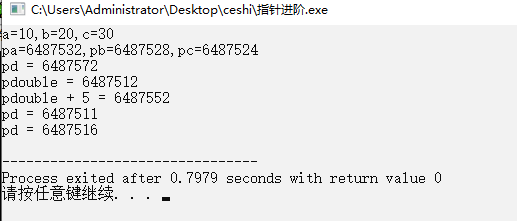Pointer advanced (I)
Pointer operation
1. Pointer operation
Pointer + integer = pointer
Pointer integer = the rules for pointer and addition are the same.
Conclusion: actual increase \ decrease = integer + - the memory size of the type pointed to by the pointer
int a = 10,b = 20,c = 30;
printf("a=%d,b=%d,c=%d\n",a,b,c);
int *pa = &a,*pb = &b,*pc = &c;
printf("pa=%d,pb=%d,pc=%d\n",pa,pb,pc);
int *pd = pa +10;
printf("pd = %d\n",pd);
double d = 45.6;
double *pdouble = &d;
printf("pdouble = %d\n",pdouble);
printf("pdouble + 5 = %d\n",pdouble + 5);
char ch = 'A';
char *pch = &ch;
printf("pd = %d\n",pch);
printf("pd = %d\n",pch + 5);

Pointer - pointer = unit length
printf("%d\n",pa - pb );
Pointer operation
Used in a continuous memory space, array, dynamically opened memory
int arr[10] = {1,2,3,4,5,6,7,8,9,10};
printf("arr = %d\n",arr);
printf("arr = %d\n",&arr[0]);
printf("arr = %d\n",&arr[1]);
//arr is a constant
//The type of arr points to a pointer of type int
int* parr = arr;
printf("arr = %d\n",arr+1);
printf("arr = %d\n",arr+2);
printf("arr = %d\n",arr+10);//Can print, but it's out of bounds
Relationship between pointer and one-dimensional array:
//deduction arr + 0 = &arr[0] arr + 1 = &arr[1] arr + 2 = &arr[2] ... arr + 3 = &arr[3] //Continue derivation *(arr + 0) = arr[0] *(arr + 1) = arr[1] *(arr + 2) = arr[2] ... *(arr + 3) = arr[3]
be careful:
, < the size of these two judgment pointers needs to be compared in a continuous memory space.
== != The two can be compared at will.
Pointer advanced (II)
Relationship between pointer and two-dimensional array:
1. What does arr mean? What is the first address type? Not a pointer to an int, but a pointer to a one-dimensional array
2. You can make a two-dimensional array into a one-dimensional array, but each element in this one-dimensional array has five elements
int i = 0;
int j = 0;
int arr[4][5]=
{
{1,2,3,4,5},
{6,7,8,9,10},
{11,12,13,14,15},
{16,17,18,19,20}
};
for(i = 0;i<4;i++)
{
for(j = 0;j<5;j++)
{
printf("a[%d][%d] = %d ",i,j,arr[i][j]);
//Another access method:
printf("a[%d][%d] = %d ",i,j,*(*(arr+i) + j));
}
// printf("\n");
}
Pointer array: it is an array. All stored in the array are pointers.
int * arr[4] = {&a,&b,&c,null };
Array pointer: is a pointer
typedef int(*PARR)[5];//Is a new type, array pointer type arr; //The array pointer points to an array int (*parr)[5] = arr;//The array pointer is now defined PARR parr2 = arr;
How much is the address offset?
printf("%d\n",arr + 0);//Bytes offset = type * Size
printf("%d\n",arr + 1);
printf("%d\n",arr + 2);
printf("%d\n",arr + 3);
printf("\n");
Indirect access
printf("%d\n",*(arr + 0));//Get the whole array, array name = "arr2[0]
printf("%d\n",*(arr + 1));
printf("%d\n",*(arr + 2));
printf("%d\n",*(arr + 3));
deduction:
*(arr + 0) = >arr[0] *(arr + 1) = >arr[1] *(arr + 2) = >arr[2] *(arr + 3) = >arr[3]
arr + 0; // Type is a pointer to the entire one-dimensional array
arr[0]; // A type is a pointer to an integer
*(*(arr+0) + 0) => arr[0] + 0;
*(arr+0) + 2 =>&arr[0][2]=> arr[0] + 2;
*(*(arr+0) + 2) =>3//Get the number 3
printf("%d\n",*(*(arr+1) + 2));
deduction
*(*(arr+0)+0) => arr[0][0] *(*(arr+0)+1) => arr[0][1] *(*(arr+0)+2) => arr[0][2] *(*(arr+0)+3) => arr[0][3]
3D array:
int arr[2][3][4] = {0,1,2,3};
int (*parr)[3][4] = arr;
The relationship between pointer and string. The type of this pointer is char *
//First address of string, pointer
printf("%d\n","hello,world");
char *str = "hello world";
printf("%s\n",str);
*"hello,world";
printf("hello,world = %c\n",*"hello,world"); //What you get is h
printf("hello,world = %c\n",*("hello,world"+1)); //Print out e
Array subscript access and array indirect access
printf("hello,world [0]= %c\n","hello,world"[0]);
Array pointer: a pointer to an array
The difference is that the occupied space is different.
char str[4][10] = {"hello world","china","123456","yellow"};
char *strarr[4] = {"hello world","china","123456","yellow"};
for(i = 0;i<4;i++)
{
printf("%s\n",strarr[i]);
}
Advanced pointer (III)
Exchange the values of two variables
The value and the address are different. The value is a copy of the pass. Whether the value is passed or the address is passed, it is a copy.
void swap(int *pa,int *pb)
{
int temp = *pa;
*pa = *pb;
*pb = temp;
}
void display(char* str)
{
printf("%s\n",str);
}
Pass an array
When an array is passed as a function parameter, the first address is passed instead of the entire array. It has become an address instead of an array.
//Mode 1
void printArr(int arr[],int length);
//Mode 2
void printArr(int *arr,int length)
{
for(int i; i<length;i++)
{
//printf("%d, ",arr[i]);
printf("%d, ",*(arr+i));
}
printf("\n");
}
//Main function
printArr(arr,sizeof(arr)/sizeof(arr[0]));
A two-dimensional array is passed as a function parameter.
void printArr2(int (*arr)[5],int x,int y)
{
for(int i = 0; i<x;i++){
for(int j = 0; j<y;j++)
{
printf("%d, ",arr[i][j]);
}
printf("\n");
}
}
//Two dimensional arrays are passed as function parameters
int arr2[4][5] = {1,2,3,4,5,6,7,8,9,10,11,12,13,14,15,16,17,18,19,20};
printArr2(arr2,4,5);
void showdouble(double *d)
{
printf("Floating point number:%f\n",*d);
}
double d = 456.678;
showdouble(&d);
Pointer as the return value of the function
Note: the returned address must be available, that is, it is not released.
int* test()
{
int a= 10,b=20,c=10;
c = a + b;
return &c;
}
int *p = test();
*p = 45; //It cannot be used later
printf("p=%d\n",*p);
//No problem
int* test1(int *c)
{
*c = 1000;
return c;
}
int *pa = test1(&a);
printf("a= %d\n",a);
Arrays cannot be returned as function parameters.
Function pointer:
What is the type?
A type is a pointer to a function.
void show()
{
printf("Hello");
}
printf("show = %d\n",show); //Print function name, function pointer
void(*pShow)() = show;//pShow is a function pointer
(*pShow)();
//Another way of writing
pShow();
Pointer to function
typedef void (*PSWAP)(int *,int *) ;//Define a new type
void (*pswap)(int *pa,int *pb) = swap;//Pointer to function
pswap(&a,&b);
PSWAP pswap = swap; //Alias
printf("a=%d,b=%d,c=%d\n",a,b,c);